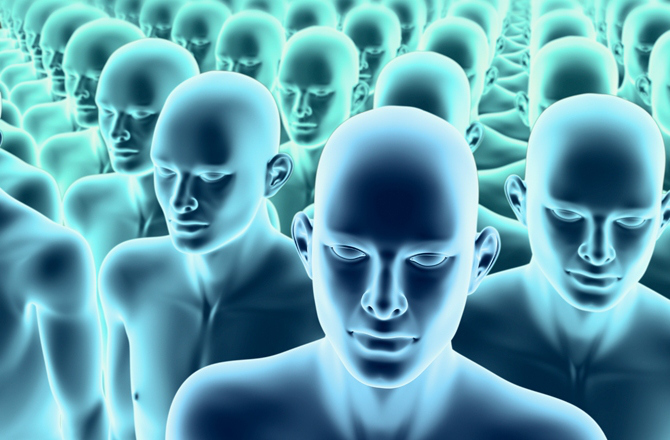The word cloning congers up many images. Some of these images are comical, some are disturbing, and some are hopeful. There are a lot of intense arguments that occur when people start to debate a subject like cloning. Some are emotional and somewhat irrational; others are thoughtful and carefully considered. One thing is certain. The reality of cloning is upon us, and we will need to address the issues that this scientific breakthrough has created.
Many organisms had already been produced by cloning, such as bacteria, plants, and frogs, but most people first became aware of cloning when a sheep named Dolly came into the world in July of 1996. Starting out as a science experiment in a test tube, the life of Dolly was an amazing phenomenon. As the first animal to be cloned from an adult mammalian cell, Dolly was an enormous scientific achievement. Even though it took over two hundred and seventy five eggs to produce her, she lived a great life (aside from the arthritis from which she began to suffer in August, 2001). And, because her caretakers wanted her to live as normal a life as possible, she was allowed to live among other sheep and even breed, producing 6 lambs. Dolly was euthanized on February 13, 2002 due to severe lung disease and arthritis. In spite of rumors to the contrary, it is not believed that Dolly’s health problems were a result of her having been cloned.
Cloning is a very wide term used to define many methods of creating a new organism that is an exact replica of the original. Cloning can be done artificially (like Dolly) or organically, such as the way some plants and bacteria create their own genetically identical offspring. There are three kinds of non-organic cloning. Reproductive cloning is producing a clone of a whole organism; therapeutic cloning is known by most as stem cell cloning, a promising medical procedure used to replace or repair cells damaged by Injury or disease. The last type of cloning is known as gene cloning, and is used to make copies of an organism’s DNA.
Everyone should know about the pros and cons of cloning, before making a personal determination as to its acceptability.
Medical and Scientific Advantages
- One of the most interesting things is the possibility that a sterile person could have a child with his/her partner – a child who possesses the DNA of both parents, thanks to reproductive cloning.
- Another is that we can repair or replace damaged cells, perhaps, at some point limbs and organs that have been damaged or destroyed by trauma or disease.
- One heatedly debated potential of cloning is known as “donor clones,” that is the production of an exact replica of a person for the purpose of future harvesting of body parts and/or organs.
Concerns and Potential Disadvantages
There remain many questions surrounding the medical and scientific uses of cloning, present and future.
- Will we produce “designer babies” through these procedures?
- Who will be the recipients of cloning procedures – only those who can afford such procedures? Will this then set up a new “super” class of humans who will have the power to dominate everyone else?
- There may be psychological effects on the cloned organism that we cannot predict. (http://thefarnsworths.com/science/cloning).
- Will we simply put into place an eventual “black market” for body parts and cloned humans, a market that can be controlled by money and a new “Mafia?”
- Are we playing God by creating life in an unnatural way? Many religious and secular individuals alike share these concerns.
Whether you believe that the potential advantages outweigh the potential harm or vice versa, there are some concerns that will certainly face our future, if cloning continues to advance, as it surely will.
- Who will regulate its use?
- How will its use be regulated?
- Will the benefits be available to all equally?
Scientists and governments have yet to address this topic together. If it is not soon addressed, moreover, we will have a situation in which science has outpaced our ability to engage in some rational pro-active decision-making.
- There are a few questions that no one has learned the exact answer to such as, “Will Cloning have any psychological effects on the cloned organisms mental health?” or “What about the lack of individuality or genetic structure?” (http://thefarnsworths.com/science/cloning). Being newer technology, it’s hard to know exactly what all of the risks are. As the cloning process becomes more advanced there will be fewer risks, more preciseness, and fewer uncertainties.
You can find a best custom essay writing service for writing a best essay in Trustessays.com
